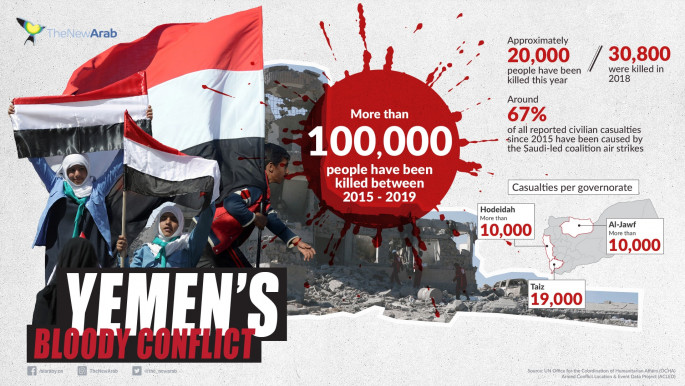Yemen govt, separatists to sign power-sharing deal on Tuesday in presence of Saudi crown prince
Yemen's internationally recognised government will sign an agreement with southern separatists on Tuesday aimed at ending a conflict simmering within the country's long-running war, Yemeni and Saudi officials said.
The power-sharing deal would see the secessionist Southern Transitional Council (STC) handed a number of ministries, and the government return to the main southern city of Aden, according to officials and Saudi media reports on Saturday.
Yemeni Information Minister Muammar al-Iryani tweeted that an official signing ceremony for the "Riyadh Agreement" would take place in Saudi Arabia on Tuesday in the presence of Saudi Crown Prince Mohammed bin Salman and Yemeni President Abedrabbo Mansour Hadi.
Abu Dhabi Crown Prince Mohammed bin Zayed Al-Nahyan will represent the United Arab Emirates, the main partner in the Saudi-led coalition backing Hadi's government, Saudi ambassador to Yemen Mohammed al-Jaber tweeted.
The UAE-backed Security Belt Forces - dominated by the STC - in August took control of Aden, which had served as the beleaguered government's base since it was ousted from the capital Sanaa by Iran-backed Houthi rebels in 2014.
Twitter Post
|
The clashes between the separatists and unionist supporters of the government, who for years fought on the same side against the Houthis, had raised fears the country could break apart entirely.
The separatists - who seek renewed independence for the south, which was a separate country until 1990 - have received arms and training from the UAE.
Abu Dhabi accuses Hadi's government of allowing Islamist elements to gain influence within its ranks.
In recent weeks the government and the separatists have been holding discreet indirect talks mediated by Saudi Arabia in the kingdom's western city of Jeddah.
Sources on both sides have said that the parties struck a power-sharing deal.
Saudi Arabia's Al-Ekhbariya state television has reported a government of 24 ministers would be formed, "divided equally between the southern and northern provinces of Yemen".
Under the deal, the Yemeni prime minister would return to Aden to "reactivate state institutions", it added.
Al-Ekhbariya said the Saudi-led coalition would oversee a "joint committee" to implement the agreement.
The coalition led by Saudi Arabia and the United Arab Emirates intervened in Yemen in 2015 as the Houthi rebels closed in on Aden, prompting Hadi to flee into Saudi exile.
The conflict has since killed tens of thousands of people - most of them civilians - and driven millions more to the brink of famine in what the United Nations calls the world's worst humanitarian crisis.
 |
100,000 killed
Last week, the Armed Conflict Location & Event Data Project [ACLED] revealed the war has killed more than 100,000 people since 2015.
ACLED, said approximately 20,000 people have been killed this year, already making 2019 the second-deadliest year on record after 2018, with 30,800 dead.
Saudi-led airstrikes have hit schools, hospitals and wedding parties and killed thousands of Yemeni civilians. The Houthis have used drones and missiles to attack Saudi Arabia and have targeted vessels in the Red Sea.
Civilians have suffered the most in the conflict, which has created what the United Nations says is the world's worst humanitarian crisis.
Read also: Will the Saudi-brokered deal stop UAE's meddling in Yemen's south?
ACLED said April was the most lethal month so far this year, with over 2,500 reported killed, compared to approximately 1,700 in September.
It said up to 1,100 civilians have been killed so far in 2019, with targeted anti-civilian violence centered in the provinces of Dhale, Hodeida, Hajjah and Taiz.
The project said the Saudi-led coalition and its allies were responsible for more than 8,000 deaths resulting from the direct targeting of civilians since 2015, and the coalition airstrikes caused around 67 percent of all reported civilian deaths.
ACLED said that although the number of Saudi-led coalition airstrikes is at an all-time low, civilian fatalities from air raids have risen for the first time since the end of 2017, more than doubling in the third quarter of 2019, compared to the previous quarter, primarily due to a strike on a prison facility in Dhamar province that killed at least 130 detainees.
The group said it recorded over 19,000 people killed in the southwestern province of Taiz since 2015, making it the most violent province in Yemen, largely due to a four-year siege by the Houthis, the group said.
Hodeida and Jawf followed Taiz as the next most violent provinces, with more than 10,000 total reported killed in each region since 2015, according ACLED.
The data covers everything from airstrikes, shelling and ground battles between the various forces to militant bombings and violence at protests. But their numbers do not include those who have died in the humanitarian disasters caused by the war, particularly starvation.
The group, which receives funding in part from the United States State Department and Dutch Ministry of Foreign Affairs, builds its database on news reports from Yemeni and international media and international agencies.
Follow us on Twitter and Instagram to stay connected





 Follow the Middle East's top stories in English at The New Arab on Google News
Follow the Middle East's top stories in English at The New Arab on Google News


